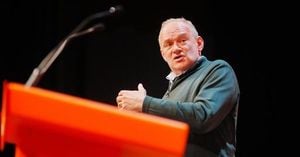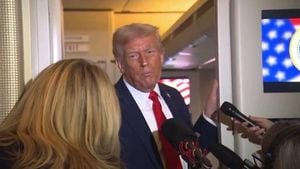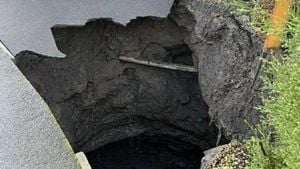The United Kingdom’s recognition of Palestinian statehood has sent ripples through the international political landscape, marking a dramatic shift in British foreign policy and reigniting debate over the future of the Middle East. On September 22, 2025, a ceremony in west London brought together diplomats, politicians, and activists to mark the UK’s official acknowledgment of Palestine as a state—a move that both supporters and critics agree is laden with historical and political significance.
At the heart of the ceremony stood Husam Zomlot, head of the Palestinian Mission to the UK, who held aloft a new sign identifying the London base as the “Embassy of the State of Palestine.” Applause filled the room as the plaque was unveiled, signaling a new chapter for Palestinian representation in Britain. Health Secretary Wes Streeting, Scotland’s First Minister John Swinney, and independent MP Jeremy Corbyn were among the notable attendees, underlining the event’s political weight. According to BBC, the recognition means overseas Palestinian diplomatic premises in the UK can now be upgraded to full embassy status, though the British government has yet to specify when its Consulate General in East Jerusalem might receive a similar upgrade.
The UK’s decision, announced just a day earlier by Prime Minister Sir Keir Starmer, was made in concert with Canada, Australia, and Portugal. It comes at a time when the two-state solution—envisioning a Palestinian state in the West Bank and Gaza Strip, with East Jerusalem as its capital—appears more imperiled than ever. As Starmer put it, the move was intended to “revive the hope of peace and a two-state solution,” despite acknowledging that it would not immediately ease the ongoing humanitarian crisis or secure the release of hostages in Gaza.
Foreign Secretary Yvette Cooper, speaking to the BBC before attending a United Nations conference in New York, made it clear that the UK’s recognition was not a reward for violence. “We have been clear that this decision that we are taking is about the best way to respect the security for Israel as well as the security for Palestinians. It’s about protecting peace and justice and crucially security for the Middle East and we will continue to work with everyone across the region in order to be able to do that,” she said. Cooper also warned Israel against any retaliatory annexation of the West Bank, a concern echoed by European officials and diplomats from France, Portugal, and Belgium, all of whom are moving toward similar recognitions of Palestinian statehood.
The response from Israel was swift and fierce. Prime Minister Benjamin Netanyahu condemned the recognition as “a huge reward to terrorism,” referencing the October 7, 2023, Hamas attack on Israel that killed 1,200 people and resulted in 251 hostages. Netanyahu doubled down on his government’s stance, stating, “We doubled Jewish settlement in Judea and Samaria [the West Bank] and we will continue on this path.” Far-right ministers Bezalel Smotrich and Itamar Ben-Gvir called for the wholesale annexation of the West Bank, arguing that the days when Britain and other countries could determine Israel’s future were over. “The only response to this anti-Israeli move is sovereignty over the historic homeland of the Jewish people in Judea and Samaria, and permanently removing the folly of a Palestinian state from the agenda,” Smotrich declared on X (formerly Twitter), as reported by The Guardian.
International reactions were divided. The United States described the UK’s move as a “diplomatic gift to Hamas,” with a State Department spokesperson dismissing it as “performative.” Israeli government spokesperson David Mencer accused the UK’s Labour government of “abandonment,” while the US insisted that its focus remained on the release of hostages and the security of Israel. On the other end of the spectrum, Palestinian Authority President Mahmoud Abbas welcomed the decision, saying it would help pave the way for the “state of Palestine to live side by side with the state of Israel in security, peace and good neighbourliness.” Hamas, for its part, called the recognition “an important step in affirming the right of our Palestinian people to their land and holy sites,” but insisted that it must be accompanied by practical measures leading to an “immediate end” to the war.
The move has also reignited debate within Europe. Portugal joined the UK in recognizing Palestine, and France is expected to follow suit at the UN General Assembly. Malta announced plans for formal recognition, while Germany, Italy, and Japan remain hesitant, preferring to tie recognition to the outcome of future negotiations. According to The Guardian, European officials have warned Israel that any annexation of the West Bank could trigger trade restrictions, increased sanctions on violent settlers, and formal adoption of international legal opinions against the occupation.
Meanwhile, the humanitarian situation in Gaza continues to deteriorate. A recent UN commission of inquiry accused Israel of committing genocide in Gaza, citing nearly 65,000 deaths in Israeli attacks over the past two years and a famine declared in Gaza City by UN-backed health experts. Israel has categorically denied these allegations, calling the report an “embarrassment to the legal profession” and blaming Hamas and international aid agencies for any hunger. The UK’s own ministers have cited the relentless expansion of Israeli settlements in the West Bank—illegal under international law—as a key factor in their decision to recognize Palestinian statehood.
Critics of the UK’s move, both in Israel and among Western allies, argue that recognition is either a reward for Hamas or an empty diplomatic gesture. Some, like the US and Israel, point to what they describe as endemic corruption and lack of democratic accountability in the Palestinian Authority, and question whether a genuine partner for peace exists. Others, including authors Robert Malley and Hussein Agha, dismiss the two-state solution as a “meaningless distraction,” arguing that recognition alone will not change the realities faced by Palestinians under occupation.
Supporters of recognition, however, see it as a necessary step to preserve the possibility of a negotiated peace. The UK’s minister for the Middle East, Hamish Falconer, summed up this perspective, saying “the time is right now because a two-state solution is under peril like never before.” As the world watches, the UK’s decision—rooted in both moral obligation and strategic calculation—has added new urgency to an already volatile situation.
For now, the Palestinian flag flies over a newly designated embassy in London, a symbol of hope for some and a source of deep frustration for others. Whether this recognition will nudge the region closer to peace or deepen existing divides remains to be seen, but the UK’s bold step has ensured that the debate over Palestinian statehood is once again front and center on the world stage.






